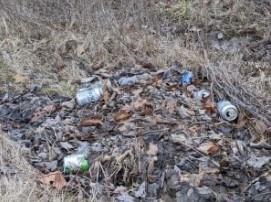Along with being unsightly, this litter may be accidentally ingested by livestock if it is baled in hay or harvested with grain and can cause damages to equipment if it becomes entangled. Ingested metals and plastics can lead to a variety of digestive problems that can cause chronic struggles, acute illness, and/or death. Animals that have a digestive obstruction may waste away before the mystery of why is solved. Managers may notice that the animal is behaving oddly. They will often go off feed, have watery stool, and gradually lose body condition, but rarely show signs of an infection.
Ultrasounds may reveal the issue, but not always. Contents of the digestive tract can be difficult to distinguish on an ultrasound, depending on the material. Metal objects (which can cause hardware disease) or intestinal twisting may be obvious, but contaminants like plastic or Styrofoam are less so. On an ultrasound, plastic and Styrofoam may appear to be plant material in the rumen.

Sheets of plastic (large or small) will float on top of the rumen fiber mat and could block the healthy movement of gases through either end of the animal, thus causing bloat. If many pieces of plastic are ingested, the warmth of the rumen can bind the small particles into dense masses that can block further passage into the intestines and cause malnutrition. They can become lodged in the esophagus during regurgitation and cause suffocation. Alternatively, the plastic could remain in the rumen, getting tangled up with plant material, and taking up space in the rumen, causing decreased intake. In the case of the latter, the animal’s demise can progress very slowly and go undetected until natural death or processing.
To learn more about preventing and recognizing stomach obstructions of livestock you can watch a presentation on the topic from March 2020 on YouTube at https://youtu.be/cejOIGFoj0Y.

It’s easier to remove litter in pasture or hay fields before spring growth begins.
Remember that littering is a crime in the State of Ohio. If you witness littering, you can report the offense to the Ohio Department of Transportation online at www.dot.state.oh.us. Law enforcement officers including police officers, state patrol, and wildlife officers can issue tickets to litterers. Report your location, a description of the occurrence, and the license plate of the offender if you can. Under Ohio law, litter is “any trash thrown, discarded or dropped by a person onto public property, private property not owned by the individual, or into Ohio’s waterways. The Ohio Revised Code prohibits littering, regardless of whether or not it was intentional. Numerous laws prohibit littering and illegal dumping. Littering is a serious offense, punishable by fines of up to $500 and 60 days in jail.” More details about litter prevention can be found at www.keepohiobeautiful.org.
The Ohio Department of Transportation estimates that annual roadside litter in our state totals nearly twelve tons and costs about $10 million dollars to address. While we can’t pinpoint who’s litter belongs to who while gathering it out of a field after a flood, we can continue to share our experiences with the general public to help spread the message that litter is a serious issue worthy of addressing for ecosystem health and our local economies.
If you have litter strewn across a field right now, be sure to get out to gather and dispose of it before spring grass growth resumes in a few weeks! It will only become more challenging to remove as time goes on.
Source : osu.edu